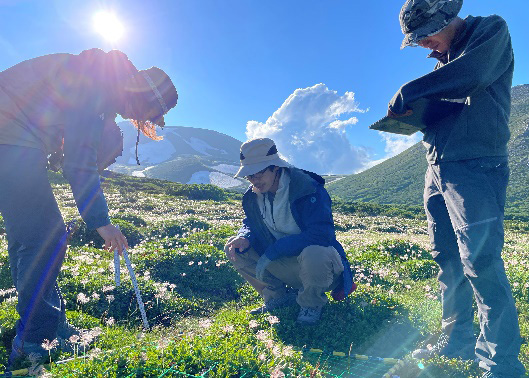- HOME
- Research
- Research Category
- Biodiversity and Ecosystem Services Mori Laboratory
Biodiversity and Ecosystem Services
Mori Laboratory
Basic and applied research to identify the mechanisms of maintenance of biodiversity and its benefits to people
We focus on both fundamental and applied ecology to explore the causes and consequences of biodiversity. Our research activities are based on a variety of approaches, including field observations, manipulative experiments, statistical models, mathematical calculations, and social surveys.
In particular, we are conducting basic research on the biota of vascular plants, arthropods, and fungi in terrestrial ecosystems to identify the primary factors that determine local species assemblages by focusing on the roles of stochastic and deterministic processes of biodiversity organization. At the same time, we are conducting applied research to advance our theoretical understanding of the mechanisms of how ecosystem services can be supported by biodiversity.
The benefits of nature to people are known as ecosystem services. It is not enough to just have nature, but it is known that various ecosystem services are enhanced in systems with high biodiversity. For example, we have quantitatively shown that forests rich in tree species can increase carbon sequestration through primary production by trees, which in turn leads to climate change mitigation. We are conducting research to unravel the mechanisms behind such phenomena of biodiversity-ecosystem services linkages. By implementing our findings in the real world, we aim to demonstrate the value of biodiversity in solving many social and environmental problems, including climate change.

A primary forest in Shiretoko National Park

Fieldwork in an alpine tundra

A view from a camp in the high arctic tundra, Ellesmere island
We feel that the term "biodiversity" is gradually permeating society. However, its inherent nature and meanings remain largely misunderstood and unexplored. In our group, we conduct field- and theory-based research to understand how biodiversity is maintained and how it ensures the functionality of ecological systems. When ecosystems maintain their inherent functionality, it preserves the "blessings of nature" that our society depends on. Examples of the benefits we receive from nature include forests sequestering carbon, which helps mitigate global warming. This functionality is enhanced when forests harbor diverse species and genotypes. We engage in fundamental science to understand the key mechanisms operating in nature and applied science to elucidate their connections to society.
Member

-
- Professor
Akira S MORI
Research Area: Ecology, Forest science, Sustainability science, Natural capital, Resource management - Professor
Laboratory Homepage
Tags

